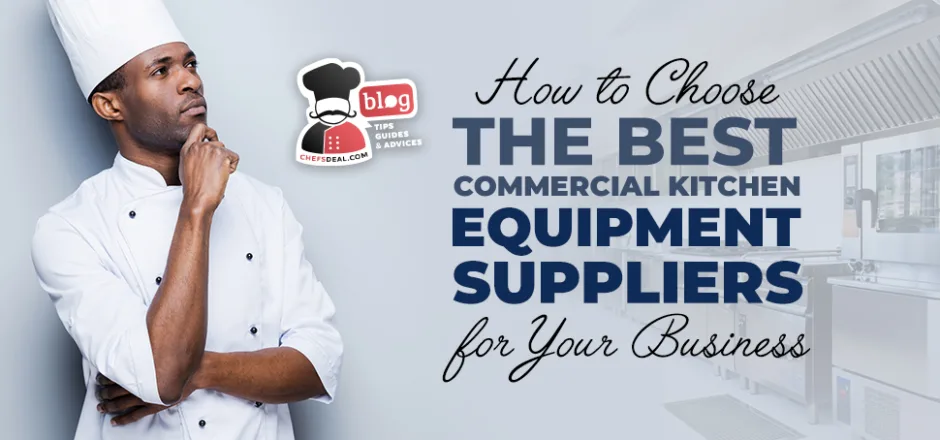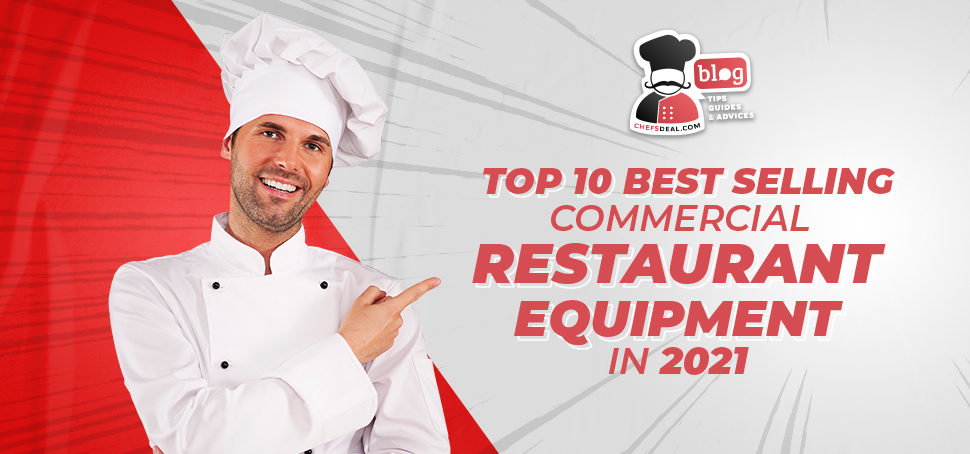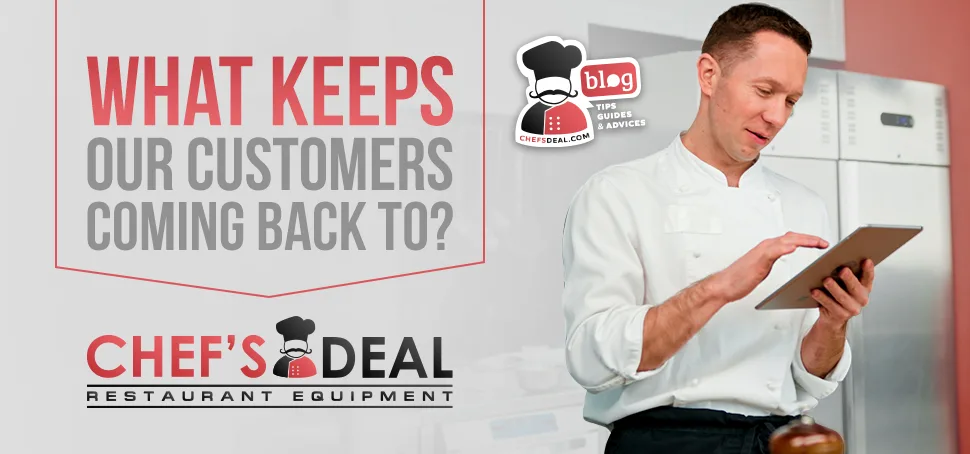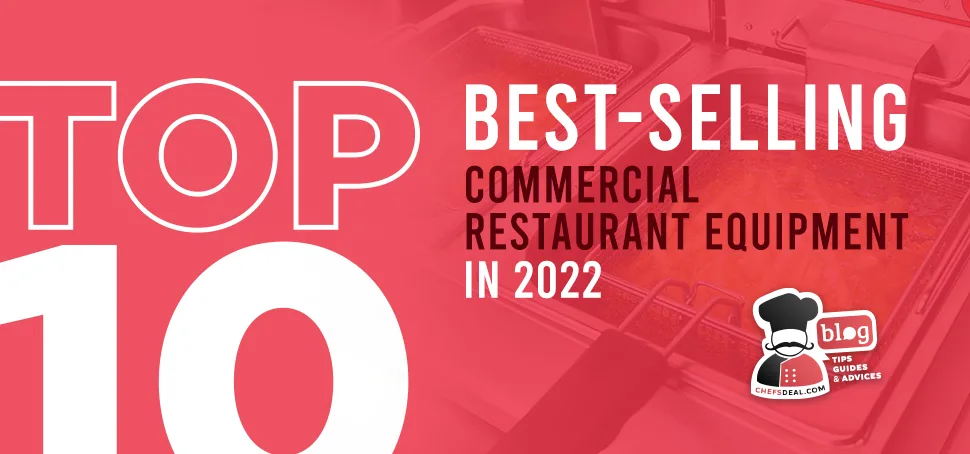Running a lucrative foodservice business starts with choosing the right commercial kitchen equipment supplier because finding the most efficient, versatile, and durable equipment for your kitchen depends on partnering with a trusted supply store. The kitchen is the heart of all restaurants. It is the central hub where food is prepared, cooked, and plated before ending up on customers’ tables. Therefore, it plays a crucial role in the overall success of any food and beverage-serving business. This blog writing details compelling reasons and key steps for choosing a reputable commercial kitchen equipment supplier.
7 Considerations When Choosing The Right Commercial Kitchen Equipment Supplier
All the appliances in a kitchen must provide the space and resources for creating diverse menus that will keep your facility ahead of trends. Buying from a dependable commercial kitchen equipment supplier is the quickest way to achieve this result. Investing in the right kitchen appliances from a restaurant equipment supplier provides budget balance, removes food safety concerns, and enhances your operations. Here are 7 important points that show how choosing the right commercial kitchen equipment supplier impacts the success and efficiency of your business.
1. Quality & Reliability: Smooth operations require reliable appliances. Contracting with a recognized commercial kitchen equipment supplier ensures that you receive premium-quality ranges, fryers, or utensils that are durable, perform efficiently, and withstand the rigors of commercial kitchen environments. You can thus minimize downtime, reduce maintenance and repair costs, and increase productivity, leading to more profitable business performance.
2. Operational Efficiency: Reliable equipment suppliers with expertise and experience in restaurant equipment offer appliances that match your expectations. Having efficient kitchen equipment streamlines workflow and reduces food prepping and cooking times. Conversely, using outdated or inefficient equipment leads to bottlenecks, slower service, and unhappy guests.
3. Consistency In Food Quality: Taste consistency matters a lot to many customers. Precise temperature control, even cooking, and proper equipment functionality all contribute to cooking consistently savory dishes. Without a commercial kitchen equipment supplier, you’ll have to extensively research such features. Let your restaurant supply store provide you with the appliances that always deliver the same high-quality food, helping build loyalty and positive word-of-mouth.
4. Safety & Compliance: Prioritizing safety protects your employees, customers, and business reputation. You can’t know all the regulatory requirements, but commercial kitchen equipment suppliers can. They closely track codes in effect and assure that your appliances comply with industry regulations, safeguarding against accidents, injuries, and potentially hefty fines.
5. Cost-Effectiveness: Long-term cost-effectiveness is equally vital as the initial cost of ownership. Selecting a commercial kitchen equipment supplier leads to significant savings in energy efficiency, reduced maintenance, and equipment longevity. Additionally, a supplier can offer affordable financing options, bulk purchase discounts, or leasing arrangements, optimizing upfront costs.
6. Menu Flexibility & Innovation: As your business grows, you want to expand or upgrade your kitchen. Commercial kitchen equipment suppliers have comprehensive knowledge of the market. They know equipment sizes, capacities, and recent advancements. Therefore, they can offer various options and scalable solutions aligning with your business growth plans.
7. After-Sales Support: Commercial kitchen supply stores sell you more than just equipment. They also provide ongoing support and service, including assistance with installation, training, maintenance, spare parts availability, and prompt response to issues and breakdowns. Your operations thus continue smoothly.
7 Steps to Choosing The Best Commercial Kitchen Equipment Supplier
Understanding your business needs, researching, evaluating, certifications, pricing, customer service, and long-term partnership are the 7 steps to choosing the commercial kitchen equipment supplier.
They are primarily engaged in retail or wholesale distribution of cooking appliances, refrigeration systems, storage units, furniture, and smallwares for restaurants. As people increasingly favor eating out, more manufacturers and supply stores are joining the market. According to the IBISWorld article about Restaurant Supply Stores in the US industry trends (2017-2022), nearly 2000 businesses account for the large market size of 13 billion dollars. Consider the following key points before you narrow down the alternatives.

1. Understand Your Business Needs
The first step in choosing the right commercial kitchen equipment supplier is identifying your specific requirements and goals. Consider factors like the type of cuisine you offer, the volume of food you plan to produce, the level of customization required, and any unique equipment needed for various menus. Your size assessment must be aligned with your anticipated growth. Purchasing appliances that can accommodate your future needs protects your budget. When you determine the scale and capacity of your equipment, follow the steps below.
- Specify your business type to narrow down your search. Do you need hotel kitchen equipment suppliers or commercial catering equipment suppliers? You’ll look for restaurant equipment parts suppliers if you only need spare parts.
- Make a rough list of the essential equipment required to meet your volume demands. Do not bend over backward to think up the details for now. Your commercial kitchen equipment supplier will finalize the list, including everything from kitchen hoods and food prep equipment to heavy-duty cooking and refrigeration equipment.
- Think about the specific features and functionality you want for each piece of equipment. Your supply store must have a large inventory of multi-functional and energy-efficient equipment that incorporates new technologies like wireless connection. ENERGY STAR-certified appliances reduce utility costs and minimize your environmental impact.
- Evaluate the available space in your kitchen and consider the layout and workflow. Measure the physical dimensions to ensure your equipment fits properly. Some commercial kitchen equipment suppliers offer space-saving or customizable solutions to maximize efficiency.
- Determine your budget. Compare different commercial kitchen supply stores and their prices. However, remember that quality and dependability count more than low prices. The lowest doesn’t always mean the best. Include long-term costs and warranties in your evaluation.
2. Research Reliable & Reputable Suppliers
Buying from reputable commercial kitchen equipment suppliers has mainly several benefits. Established suppliers have a proven record of delivering top-of-the-line products, reliable customer service, and after-sales support. They are more likely to have strong industry connections and stable supply chains. Also, they sell products compatible with industry standards and regulations. How can you learn about these?
- Conduct in-depth research about various restaurant equipment supply stores utilizing online resources, industry directories, and customer reviews. Explore their websites to collect data about product offerings, company history, and certifications.
- Seek recommendations from industry professionals and colleagues you trust. Trade shows, events, and conferences are perfect for building long-lasting networks with experts.
- Assess the suppliers’ product range and make sure they offer well-known brands. Some suppliers even compile certain equipment under the business type category so that you can quickly find everything matching your business.
- Inquire about the equipment’s availability and the commercial kitchen equipment supplier’s ability to meet your delivery timelines.
3. Evaluate Supplier Experience & Expertise
Working with experienced and knowledgeable suppliers maintains smoother operation and equipment longevity. A seasoned commercial kitchen equipment supplier holds a deeper insight into foodservice operators’ challenges and emergent equipment solutions. When you call a kitchen supply store, you want your questions answered, and demands met. Seek a trustworthy partner who can provide you with the ideal equipment, systems, and solutions addressing your specific needs. Use the following 6 points for evaluating supplier expertise.
- Review customer testimonials about the suppliers. Look for feedback from their existing and past customers to gauge their reputation and the quality of their services.
- Communicate directly with the suppliers to discover their knowledge of the latest industry trends. Ask them specific questions about different equipment functions and how they align with your business needs.
- Request product demonstrations or presentations. A knowledgeable commercial kitchen equipment supplier can showcase the equipment’s features, benefits, and applications.
- Check if the supplier actively attends industry events. Participation in such events signals a commitment to staying informed about trends and advancements.
- All the suppliers have some degree of online presence through websites and social media channels. Yet, only reputable ones share valuable and up-to-date industry-related articles, tips, and updates.
- Food culture is changing with the digital revolution. Today, restaurants demand engineered-to-order products. If you require customized equipment or have unique design specifications, choose a commercial kitchen equipment supplier who can offer tailored solutions.
4. Quality Assurance & Certification
Selecting a supply store that offers quality-assured products means consistency in equipment performance, durability, and functionality. This consistency reduces the risk of defects or substandard products, saving time and resources spent on returns, replacements, or repairs. Thus, you can focus only on satisfying your patrons with flavorful treats and refreshing drinks. Commercial kitchen equipment suppliers delivering certified products help differentiate your name and attract more customers. Here’s how you can achieve this.
- Look for suppliers who adhere to industry standards and certifications. Determine the specific certifications relevant to the products and services you need. Examples include ISO 9001 for quality management, ISO 14001 for environmental, and UL for safety certifications.
- Investigate industry directories and databases like trade associations, government websites, or online resources focusing on certified commercial kitchen equipment suppliers.
- Once you identify potential supply stores, request their certificates or statements verifying compliance. Check their audit reports, testing results, or other relevant documents.
- Cross-reference the certification details with the bodies or authorities that issued them. Contact the certification organization directly to confirm the supplier’s status.
- Arrange on-site visits or hire a third-party auditing firm to assess the supplier’s facilities, practices, and adherence to the required standards and regulations.
- Discuss and clarify warranties, maintenance services, and spare parts availability with your commercial kitchen equipment supplier to obtain long-term support for the products you purchase and avoid potential issues down the line.
5. Pricing & Value For Money
Pricing is the money a supplier charges for a product or service. However, value for money evaluates whether the price paid is justified by the overall benefits and quality received. While a low-priced product or service seems like a good deal initially, value for money considers the total cost of ownership, including additional expenses such as installation, maintenance, repairs, ongoing support, and the satisfaction derived from the purchase. Use the following tips to check pricing and value for money in equipment purchases.
- First, determine your needs and specifications for your required equipment or services. This helps you weigh quotes and pricing structures more accurately.
- Reach out to multiple commercial kitchen equipment suppliers to get quotes. Be sure that the quotes cover all the price-for-money components.
- Evaluate the value-added services offered by the suppliers. These include training programs, technical support, warranties, or extended service agreements. For instance, a free consulting service adds to the value of your investment, giving you innovative and intelligent solutions for kitchen design and layout.
- Compare their interest rates, tax benefits, and ease of application. Some suppliers also have a price match policy promising to adjust the price if you find a better offering elsewhere. Many equipment providers now furnish financing options to help you manage your budget.
- Check if the commercial kitchen equipment supplier has special programs offering you rebates or other advantages on certain appliances. For example, Chef’s Deal provides an instant discount program in 13 states for Energy-efficient restaurant equipment.
- Try to balance the cost considerations with the reliability and durability of the equipment for long-term value. Low-priced options sometimes compromise on quality, causing frequent breakdowns and inefficiencies.
6. Customer Service & Support
Commercial kitchen equipment suppliers with strong customer service and support provide quick and effective solutions to any problems or concerns. When you encounter technical issues or require troubleshooting assistance, a responsive supplier must provide timely guidance, repair services, or replacement parts. Thus, you can resume operations swiftly. Suppliers prioritizing customer satisfaction offer extended warranties, discounted repairs, or loyalty incentives, reducing expenses over time. Conversely, poor customer service impairs your brand image. You can check these in the following 5 points:
- Specify the channels, such as phone, email, or live chat, through which you can contact the restaurant equipment suppliers. Check if they have multiple options to accommodate your preferred method of communication.
- Inquire about their response times to customer claims. Prompt responses indicate a commitment to customer service.
- Determine their availability during working hours. Regarding the time zone difference, confirm that the commercial kitchen equipment supplier has representatives serving during your working hours.
- Self-service resources like online knowledge bases or FAQs help you find quick answers to common questions.
- Understand the supplier’s policy regarding returns, refunds, and exchanges. Ask about any specific conditions or limitations that may apply.
7. Consider Long-Term Partnership With Suppliers
Establishing a long-term relationship with a well-recognized commercial kitchen equipment supplier promises reciprocal benefits. You can expect higher quality in the products and services you receive because long-term partners are familiar with your requirements, preferences, and expectations. Suppliers offer better terms, volume discounts, or loyalty incentives as you work together over an extended period. Therefore, aim to build a strong rapport with your selected supplier.
- Long-term partners arrange your orders and requests first.
- You can engage in joint projects or initiatives to improve products, develop new solutions, or explore market opportunities together.
- You get valuable insights, guidance, and recommendations for ongoing equipment maintenance, upgrades, and improvements.
- A mutual understanding developed over time facilitates open communication, eliminates misunderstandings, and promotes the ability to address challenges together.

Conclusion
The magic of transforming raw ingredients into delicious recipes happens in the kitchen. Chefs’ culinary creativity and expertise combine with high-quality and versatile equipment to experiment with new flavors and cooking techniques. Your kitchen equipment’s quality, functionality, and reliability directly affect your bottom line. Partnering with an experienced commercial kitchen equipment supplier is the most reasonable approach to purchasing such products. Thus, you set the foundation for a thriving business.
In conclusion, selecting the best commercial kitchen equipment suppliers for your business is crucial to your kitchen’s smooth and successful operation. Take the time to research, evaluate, and choose wisely. Select a supplier with high-quality equipment, reliable service, and excellent after-sales support. Remember, this decision directly impacts your operational efficiency, food safety, and long-term success. So, you can use the insights and tips provided in this article to make an informed choice that aligns with your specific needs and brings you forward in the competitive food industry.






